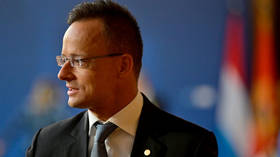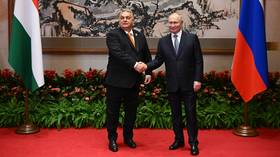Baltic leader is ‘hypocritical’ – Hungary

Estonian Prime Minister Kaja Kallas has displayed outrageous hypocrisy by chastising her Hungarian counterpart Viktor Orban for his meeting with Russian President Vladimir Putin in Beijing. That's according to Hungarian Foreign Minister Peter Szijjarto, who recalled that Kallas recently found herself in a tough spot over her husband’s business ties with Russia.
Speaking to Reuters on Wednesday, Kallas, a long-time Russia hawk, lamented that “it was very, very unpleasant to see” Orban shaking hands with Putin as the two held talks on the sidelines of China’s Belt and Road Forum. The Estonian prime minister went on to call the Russian leader “a criminal,” accusing him of “waging a war of aggression” in Ukraine.
Writing on Facebook on the same day, Szijjarto pushed back against the criticism. “With great respect, this is Kaja Kallas… whose husband, as it was recently revealed, even after the outbreak of the war [in Ukraine], still owned a share in a company that supplied €30 million worth of raw materials to a Russian factory.”
“This is hypocrisy in a cube,” he added.
Kallas first found herself in hot water in late August after the broadcaster ERR reported that transport company Stark Logistics, partially owned by her husband Arvo Hallik, continued moving some cargo in and out of Russia despite Estonia being a staunch supporter of Kiev and Western sanctions against Moscow.
Faced with a wave of intense criticism, Kallas signaled that she had no intention to step down over the controversy. She insisted that she was not involved in her husband’s business and never discussed it at home, although local media cited her financial declaration as saying that she had given a €350,000 loan to Hallik’s other company, Novaria Consult.
Kallas also became the subject of a parliamentary inquiry, with which she cooperated, but dismissed as “a witch hunt… unleashed by the opposition.”
Meanwhile, Hallik said that he would sell all of his shares in Stark Logistics and resign from its board of directors, apologizing for failing to realize that his dealings – which he noted were not illegal – could have been interpreted as unethical.













